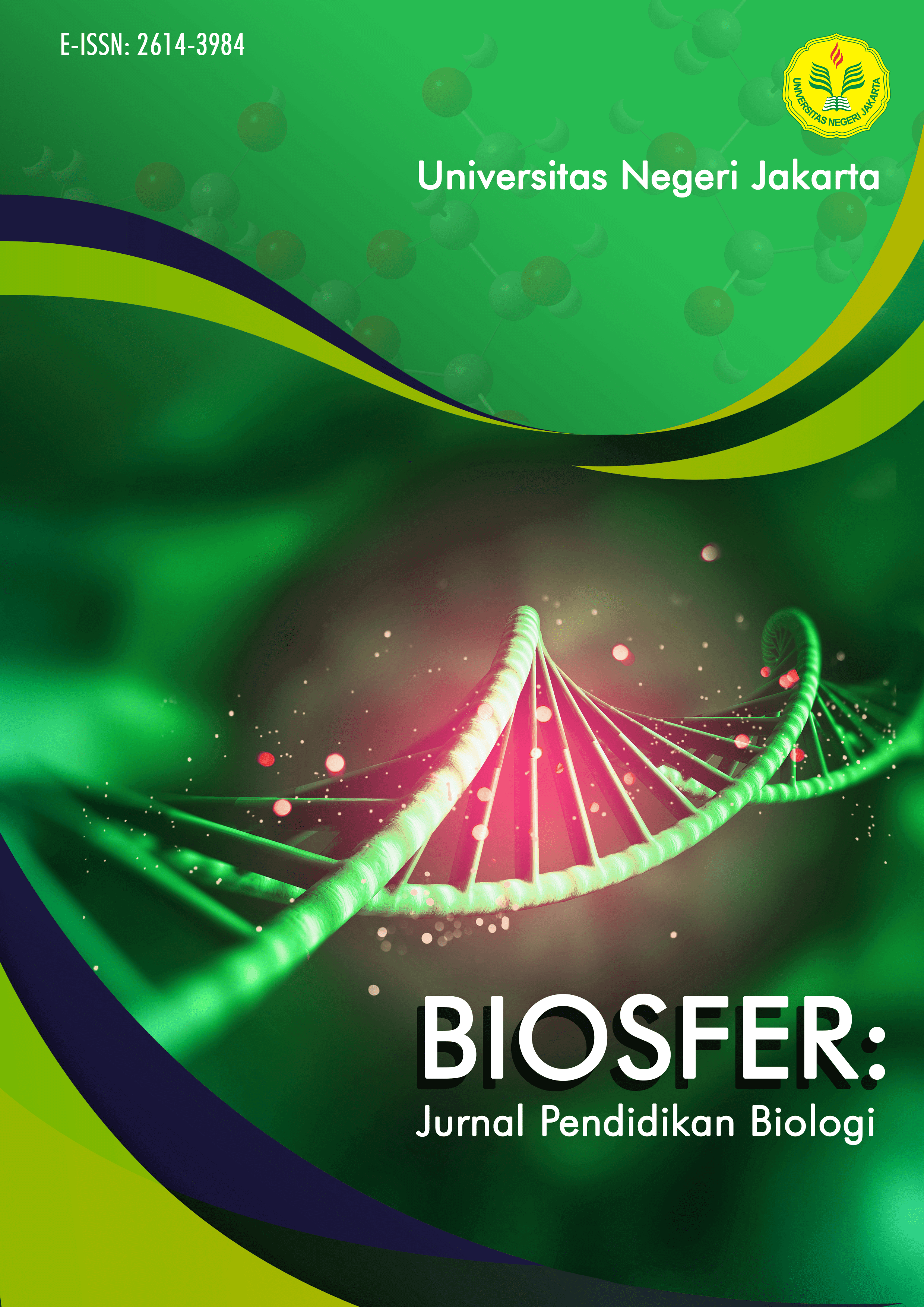Environmental literacy profile of senior high school in Mowewe Southeast Sulawesi
DOI:
https://doi.org/10.21009/biosferjpb.26787Keywords:
Cognitive skills, Environmental Literacy, Student BehaviorAbstract
Lack of awareness and human responsibility is one of the factors that have a major impact on increasing environmental problems. The purpose of this study was to describe the environmental literacy skills of class XI students of senior high school 1 Mowewe. The method used is a descriptive method with a quantitative approach. This research was conducted in the odd semester 2021/2022 academic year (September until November), at SMAN 1 Mowewe (Southeast Sulawesi, the subjects in this study were 50 students of class XI senior high school 1 Mowewe. The questionnaire was used to measure students' environmental literacy. The data were analyzed using descriptive analysis. The results showed that the indicator of knowledge was worth 59.78, the attitude indicator of students' attitudes was worth 69.18, the ability of cognitive skills to the environment was worth 74.52, and student behavior towards the environment had a value of 67.86. Based on the results of the study, it can be concluded that the environmental literacy ability of students at senior high school 1 Mowewe, namely the knowledge indicator has a value of 59.78 with a fairly good category, students' attitudes have a value of 69.18 with a good category. category, the ability of cognitive skills to the environment has a value of 74.52 with a good category, and student behavior towards the environment has a value of 67.86 with a good category.
References
Cantrell, S. C., & Hughes, H. K. (2008). Teacher efficacy and content literacy implementation: An exploration of the effects of extended professional development with coaching. Journal of Literacy Research, 40(1), 95–127. https://doi.org/10.1080/10862960802070442
Dunlap, R. E., Liere, K. D. Van, Mertig, A. G., & Jones, R. E. (2000). Measuring Endorsement of the New Ecological Paradigm : A Revised NEP Scale. Journal of Social Issues, 56(3), 425–442. https://doi.org/10.1111/0022-4537.00176
Dunlap, R. E., Van Liere, K. D., Mertig, A. G., & Jones, R. E. (2000). Measuring endorsement of the new ecological paradigm: A revised NEP scale. Journal of Social Issues, 56(3), 425–442. https://doi.org/10.1111/0022-4537.00176
Guimaraes-iosif, R., & Reis, J. (2009). Media And Environmental Literacy: Macing School Relevant. Revista Txt: Leituras Transdisciplinares De Telas E Textos, 9(1), 26–40. https://doi.org/10.17851/1809-8150.5.9.26-40
Herlanti, Y. (2016). Pengembangan Kurikulum Pendidikan Lingkungan di Kota Tangerang Selatan : Bagaimana mengintegrasikan Deklarasi Tbilisi dalam Kurikulum Developing Environmental Education as Local Curriculum in South Tangerang : How to integrated Tbilisi declaration in curr. Journal Proceding Biology Education Conference: Bioloogy, Science, Enviromental, and Learning, 13(1), 52–57. https://jurnal.uns.ac.id/prosbi/article/view/5650
Igbokwe, B. A. (2016). Environmental Literacy Assessment : Assessing the Strength of an Environmental Education Program ( EcoSchools ) in Ontario Secondary Schools for Environmental Literacy Acquisition Environmental Literacy Assessment : Assessing the Strength of an Environmen.
Karimzadegan, H., & Meiboudia, H. (2012). Exploration of Environmental Literacy in Science Education Curriculum in Primary Schools in Iran. Procedia - Social and Behavioral Sciences, 46, 404–409. https://doi.org/10.1016/j.sbspro.2012.05.131
Kusumaningrum, B., & Wijayanto, Z. (2020). Apakah Pembelajaran Matematika Secara Daring Efektif ? (Studi Kasus pada Pembelajaran Selama Masa Pandemi Covid-19). Jurnal Matematika Kreatif-Inovatif, 11(2), 136–142. https://doi.org/10.15294/kreano.v11i2.25029
Milfont, T. L., & Duckitt, J. (2010). The environmental attitudes inventory : A valid and reliable measure to assess the structure of environmental attitudes q. Journal of Environmental Psychology, 30(1), 80–94. https://doi.org/10.1016/j.jenvp.2009.09.001
Nasution, R. (2016). Analisis Kemampuan Literasi Lingkungan Siswa SMA Kelas X di Samboja dalam Pembelajaran Biologi. Proceeding Biology Education Conference, 13(1), 352–358. https://jurnal.uns.ac.id/prosbi/article/view/5746
Nugroho, A. (2018). Aksi Pendidikan Lingkungan Kaum Muda Yogyakarta dan Pemanfaatan Media. Journal of Urban Sociology, 1(2), 27–41. http://dx.doi.org/10.30742/jus.v1i2.568
Nugroho, Adityo. (2018). Aksi Pendidikan Lingkungan Kaum Muda Yogyakarta dan Pemanfaatan Media Online. Journal of Urban Sociology, 1(2), 27. https://doi.org/10.30742/jus.v1i2.568
Roberta, S., & Brien, M. O. (2007). Indications of environmental literacy : using a new survey instrument to measure awareness , knowledge , and attitudes of university-aged students.
Rokhmah, Z., & Fauziah, A. N. (2021). Analisis Literasi Lingkungan Siswa SMP Pada Sekolah Berkurikulum Wawasan Lingkungan. E-Jurnal Pendidikan Sains, 9(2), 176–181. https://ejournal.unesa.ac.id/index.php/pensa/article/view/37765
Salı, G., Körükçü, Ö., & Akyol, A. (2015). Research on the Environmental Knowledge and Environmental Awareness of Preschool Teachers 1. International Association Of Social Science Research, 1(3), 69–79.
Sayyidati, A. (2017). Isu Pemanasan Global dalam Pergeseran Paradigma Keamanan pada Studi Hubungan Internasional. Jurnal Hubungan Internasional, 6(1). https://doi.org/10.18196/hi.61103
Srbinovski, M., & Stanišić, J. (2020). Environmental worldviews of Serbian and Macedonian school students. Australian Journal of Environmental Education, 36(1), 20–43. https://doi.org/10.1017/aee.2020.1
Suryawati, E., Suzanti, F., Zulfarina, Z., Putriana, A. R., & Febrianti, L. (2020). The Implementation Of Local Environmental Problem-Based Learning Student Worksheets To Strengthen Environmental Literacy. Jurnal Pendidikan IPA Indonesia, 9(2), 169–178. https://doi.org/10.15294/jpii.v9i2.22892
Tuncer, G., Tekkaya, C., Sungur, S., Cakiroglu, J., Ertepinar, H., & Kaplowitz, M. (2009). Assessing Pre-Service Teachers ’ Environmental Literacy In Turkey As a Mean To Develop Teacher Education Programs. International Journal Of Educational Development, 4(29), 426–436. https://doi.org/10.1016/j.ijedudev.2008.10.003
Wibowo, I. (2009). Pola Perilaku Kebersihan: Studi Psikologi Lingkungan Tentang Penanggulangan Sampah Perkotaan. Jurnal Makara, Sosial Humaniora, 13(1), 37–47. https://lontar.ui.ac.id/detail?id=20299522
Yusup, F. (2021). Profil Literasi Lingkungan Mahasiswa Calon Guru Ipa. Quantum: Jurnal Inovasi Pendidikan Sains, 12(1), 128. https://doi.org/10.20527/quantum.v12i1.10098
Downloads
Published
How to Cite
Issue
Section
License
The Authors submitting a manuscript do so on the understanding that if accepted for publication, copyright of the article shall be assigned to Biosfer: Jurnal Pendidikan Biologi (Biosferjpb) and Departement of Biology Education, Universitas Negeri Jakarta as publisher of the journal.



